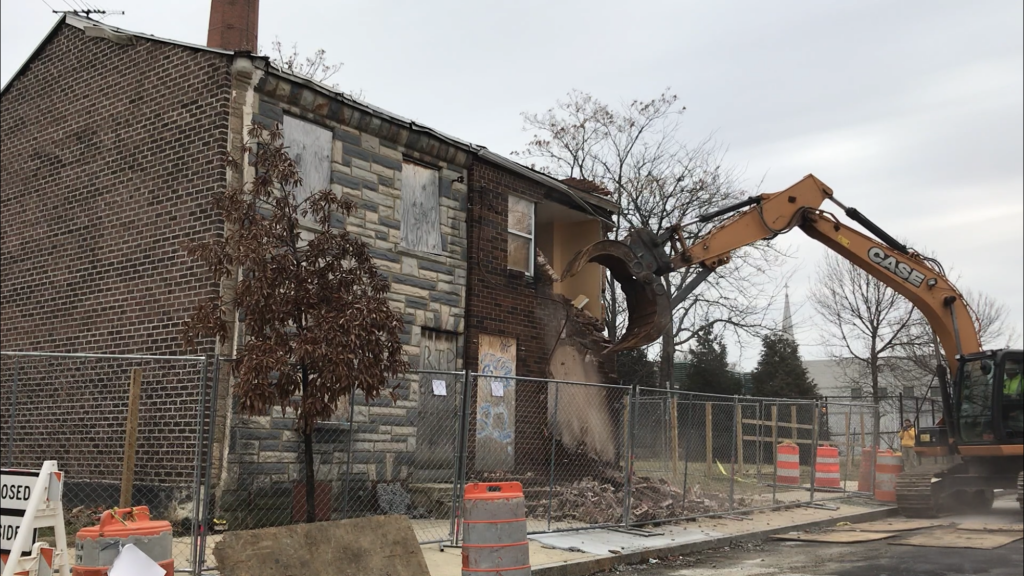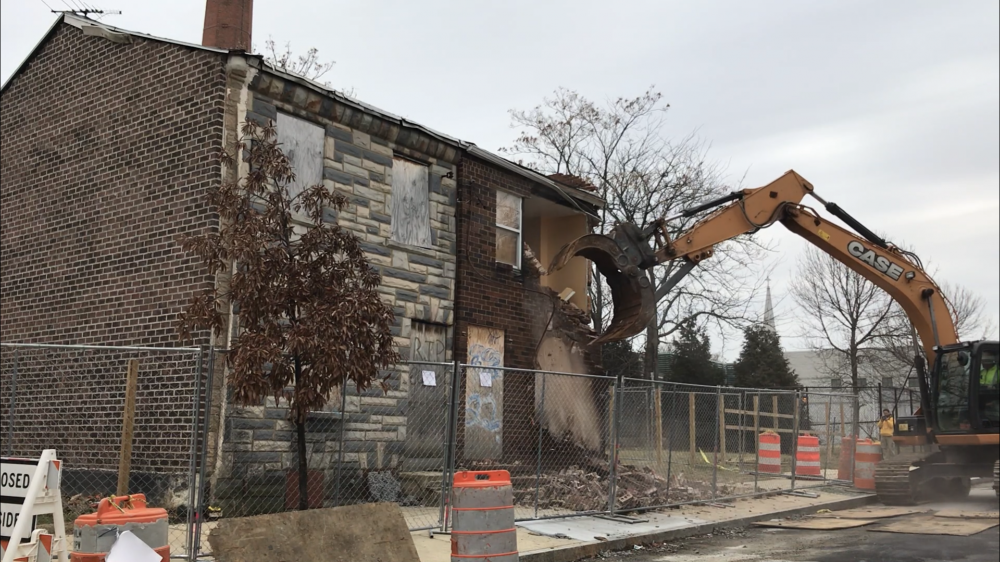[media-credit name=”Wilmington’s Mayors Office” align=”aligncenter” width=”1024″] [/media-credit]
[/media-credit]
Wilmington – January 29, 2018 – Long vacant buildings at 50 & 52 East 22nd Street were demolished to make way for affordable housing for first-time homeowners. A partnership between the Wilmington Neighborhood Conservancy Land Bank and Habitat for Humanity will develop six new homes on the site.
Community leaders gathered to commemorate the launch of the land bank’s programs. Among those witnessing the start of the demolition project on Monday were Wilmington Mayor Mike Purzycki, Wilmington City Council President Hanifa Shabazz, Wilmington Land Bank Executive Director, Christian Willauer; Habitat for Humanity of New Castle County CEO Kevin Smith, and Barclays Director of Community Relations, Jocelyn Stewart.
Wilmington Mayor Mike Purzycki said today, “By working together, we can transform vacant and blighted properties like these into affordable housing, community gardens, and new development. Our goal is a more vibrant and livable city, which we will achieve by addressing vacant and abandoned properties.”
Wilmington’s business community is playing a major role in supporting the City’s efforts to address the longstanding problems associated with neglected and blighted properties. In 2017, Barclays awarded a $1 million grant to the Land Bank, its largest private sector donation to date. “Barclays’ investment aligns with Barclays’ citizenship commitment to help the communities in which we work and live,” said Jocelyn Stewart. “In its 327-year history, Barclays has been a leader in rebuilding and revitalizing communities around the world, and we are proud to continue that tradition right here in Wilmington.”
Other supporters of the Land Bank include the City of Wilmington, Capital One, JPMorgan Chase, and the State of Delaware, which is providing funding of $645,000 for demolition and other activities of the Land Bank through its Strong Neighborhoods Fund, administered by the Delaware State Housing Authority (DSHA). “The Strong Neighborhoods Housing Fund helps families that need housing while strengthening local neighborhoods and attacking blight,” said DSHA Director Anas Ben Addi. “We are pleased to help support these projects from the Land Bank and its partners, and look forward to seeing the city become stronger.”
The Land Bank was created through enabling legislation by the State of Delaware and an ordinance from the City of Wilmington to focus on getting vacant properties back into productive use. The Land Bank is just one part of the City’s efforts to address the more than 1500 vacant properties throughout the city. Approximately 80% of these vacant properties are privately-owned. “Today is a major first step towards revitalizing the city’s poorest areas, giving new life to its neighborhoods, and attracting new residents, who in turn will contribute to the economic health and vibrancy of this great City,” said President Shabazz. “In addition to transforming blighted vacant properties into community assets, the Land Bank is poised to transform lives by helping Wilmington residents realize their dream of homeownership,” added Shabazz
In addition to stabilizing vacant properties and preparing them for future homeownership development, the Land Bank’s other primary responsibility is to maintain the properties in its inventory that have not yet sold. The Delaware Center for Horticulture and the Nature Conservancy of Delaware are working with the Land Bank and neighborhoods to reclaim vacant lots for greening purposes. A simple clean and green treatment of each lot includes removing debris, seeding and sodding the lot, planting a few trees, as well as installing a fence. “Once this initial phase is completed we hope to continue to work closely with community residents to determine the best use for the lot based on the resident’s needs and desires in their neighborhood. This could include installing a community garden, a meadow, or a few benches to keep it as an open passive green space,” says Maria Dziembowska, Director of Urban Conservation at The Nature Conservancy of Delaware. Vikram Krishnamurthy, Executive Director of the Delaware Center for Horticulture, also noted that “providing opportunities and access for purposes such as community open space, beautifying side lots, and community gardens not only enhances our neighborhoods, but puts formerly vacant lots back into productive use and transforms them into community assets.”
The Land Bank has a strong commitment to local hiring for its contracted services so that jobs created by the Land Bank are filled by Wilmington businesses and Wilmington residents. For example, Integrity Construction, which hires graduates of Interfaith Community Housing of Delaware’s HomeWorks Construction Training and Employment Program, has been engaged for boarding, trash removal, and grass cutting services. HomeWorks prepares Wilmington residents, including those facing barriers to employment and training opportunities, for jobs in the building trades. “Our strategy is to not just reinvest in Wilmington’s housing stock, but also in Wilmington’s residents,” said Christian Willauer. “This is the key to long-term sustainable growth for neighborhoods and the city.”
Source: Wilmington Mayors Office

